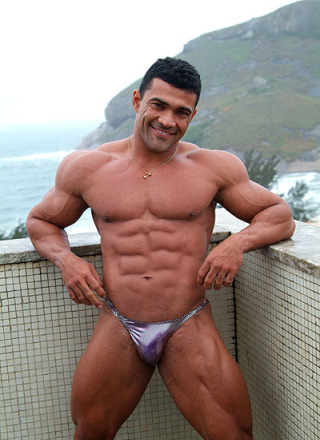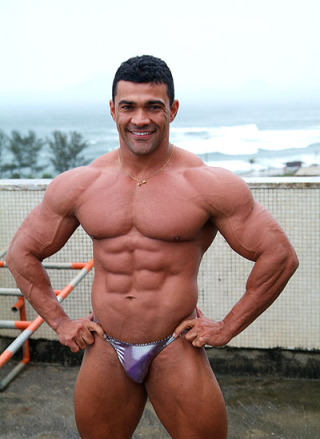#Franco Ferrara
Text
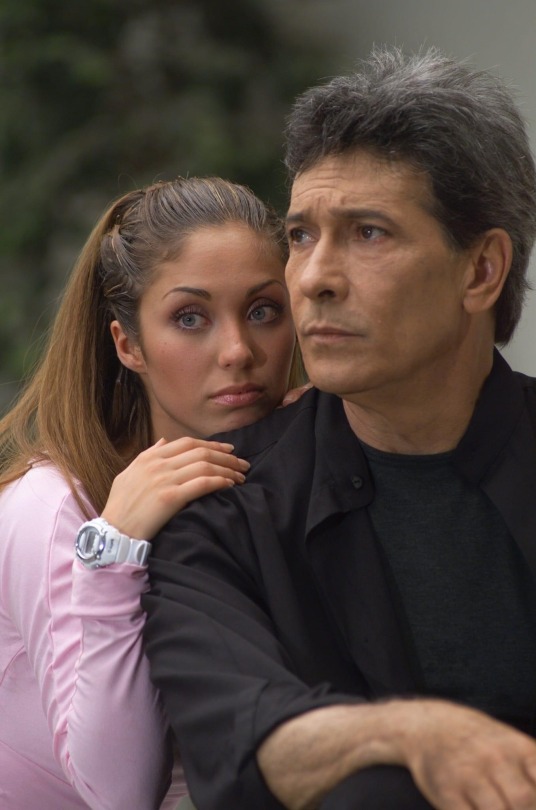
22 notes
·
View notes
Text
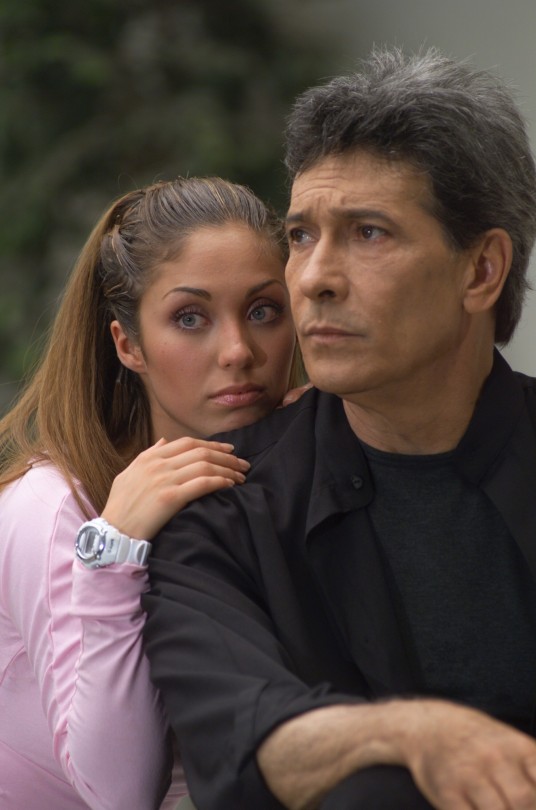
L❤️VE
2 notes
·
View notes
Text
io voto, tu voti (pci) / giorgio ferrara. 1981
io voto, tu voti (pci) / giorgio ferrara. 1981
IO VOTO, TU VOTI (PCI)
Scheda integrale: https://goo.gl/tjSyuj
Regia: Giorgio Ferrara
Casa di produzione: Unitelefilm
Anno: 1981
Abstract: Docu-fiction realizzato dal Pci per le elezioni comunali del 1981. Tre giovani (Franco Citti, Ninetto e Pier Paolo Davoli) vagabondano per Roma e scoprono una città migliorata grazie alle opere realizzate dalle amministrazioni di sinistra.
Archivio Audiovisivo…
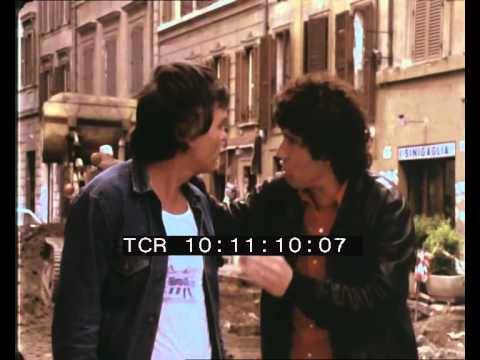
View On WordPress
#AAMOD#Archivio Audiovisivo del Movimento Operaio e Democratico#docu-fiction#docufiction#documentario#Franco Citti#Giorgio Ferrara#Io voto tu voti#Luigi Petroselli#Metropolitana#Ninetto Davoli#PCI#Pier Paolo Davoli#Roma#Unitelefilm
0 notes
Text
Opera on YouTube, Part 2
Le Nozze di Figaro (The Marriage of Figaro)
Glyndebourne Festival Opera, 1973 (Knut Skram, Ileana Cotrubas, Kiri Te Kanawa, Benjamin Luxon; conducted by John Pritchard; English subtitles)
Jean-Pierre Ponnelle studio film, 1976 (Hermann Prey, Mirella Freni, Kiri Te Kanawa, Dietrich Fischer-Dieskau; conducted by Karl Böhm; English subtitles) – Acts I and II, Acts III and IV
Tokyo National Theatre, 1980 (Hermann Prey, Lucia Popp, Gundula Janowitz, Bernd Weikl; conducted by Karl Böhm; Japanese subtitles)
Théâtre du Châtelet, 1993 (Bryn Terfel, Alison Hagley, Hillevi Martinpelto, Rodney Gilfry; conducted by John Eliot Gardiner; Italian subtitles)
Glyndebourne Festival Opera, 1994 (Gerald Finley, Alison Hagley, Renée Fleming, Andreas Schmidt; conducted by Bernard Haitink; English subtitles)
Zürich Opera House, 1996 (Carlos Chaussón, Isabel Rey, Eva Mei, Rodney Gilfry; conducted by Nikolaus Harnoncourt; English subtitles)
Berlin State Opera, 2005 (Lauri Vasar, Anna Prohaska, Dorothea Röschmann, Ildebrando d'Arcangelo; conducted by Gustavo Dudamel; French subtitles)
Salzburg Festival, 2006 (Ildebrando d'Arcangelo, Anna Netrebko, Dorothea Röschmann, Bo Skovhus; conducted by Nikolas Harnoncourt; English subtitles) – Acts I and II, Acts III and IV
Teatro all Scala, 2006 (Ildebrando d'Arcangelo, Diana Damrau, Marcella Orasatti Talamanca, Pietro Spagnoli; conducted by Gérard Korsten; English and Italian subtitles)
Salzburg Festival, 2015 (Adam Plachetka, Martina Janková, Anett Fritsch, Luca Pisaroni; conducted by Dan Ettinger; no subtitles)
Tosca
Carmine Gallone studio film, 1956 (Franca Duval dubbed by Maria Caniglia, Franco Corelli, Afro Poli dubbed by Giangiacomo Guelfi; conducted by Oliviero de Fabritiis; no subtitles)
Gianfranco de Bosio film, 1976 (Raina Kabaivanska, Plácido Domingo, Sherrill Milnes; conducted by Bruno Bartoletti; English subtitles)
Metropolitan Opera, 1978 (Shirley Verrett, Luciano Pavarotti, Cornell MacNeil; conducted by James Conlon; no subtitles)
Arena di Verona, 1984 (Eva Marton, Jaume Aragall, Ingvar Wixell; conducted by Daniel Oren; no subtitles)
Teatro Real de Madrid, 2004 (Daniela Dessí, Fabio Armiliato, Ruggero Raimondi; conducted by Maurizio Benini; English subtitles)
Royal Opera House, Covent Garden, 2011 (Angela Gheorghiu, Jonas Kaufmann, Bryn Terfel; conducted by Antonio Pappano; English subtitles)
Finnish National Opera, 2018 (Ausrinė Stundytė, Andrea Carè, Tuomas Pursio; conducted by Patrick Fournillier; English subtitles)
Teatro alla Scala 2019 (Anna Netrebko, Francesco Meli, Luca Salsi; conducted by Riccardo Chailly; Hungarian subtitles)
Vienna State Opera, 2019 (Sondra Radvanovsky, Piotr Beczala, Thomas Hampson; conducted by Marco Armiliato; English subtitles)
Ópera de las Palmas, 2024 (Erika Grimaldi, Piotr Beczala, George Gagnidze; conducted by Ramón Tebar; no subtitles)
Don Giovanni
Salzburg Festival, 1954 (Cesare Siepi, Otto Edelmann, Elisabeth Grümmer, Lisa della Casa; conducted by Wilhelm Furtwängler; English subtitles)
Giacomo Vaccari studio film, 1960 (Mario Petri, Sesto Bruscantini, Teresa Stich-Randall, Leyla Gencer; conducted by Francesco Molinari-Pradelli; no subtitles)
Salzburg Festival, 1987 (Samuel Ramey, Ferruccio Furlanetto, Anna Tomowa-Sintow, Julia Varady; conducted by Herbert von Karajan; no subtitles)
Teatro alla Scala, 1987 (Thomas Allen, Claudio Desderi, Edita Gruberova, Ann Murray; conducted by Riccardo Muti; English subtitles)
Peter Sellars studio film, 1990 (Eugene Perry, Herbert Perry, Dominique Labelle, Lorraine Hunt Lieberson; conducted by Craig Smith; English subtitles)
Teatro Comunale di Ferrara, 1997 (Simon Keenlyside, Bryn Terfel, Carmela Remigio, Anna Caterina Antonacci; conducted by Claudio Abbado; no subtitles) – Act I, Act II
Zürich Opera, 2000 (Rodney Gilfry, László Polgár, Isabel Rey, Cecilia Bartoli; conducted by Nikolaus Harnoncourt; English subtitles)
Festival Aix-en-Provence, 2002 (Peter Mattei, Gilles Cachemaille, Alexandra Deshorties, Mirielle Delunsch; conducted by Daniel Harding; no subtitles)
Teatro Real de Madrid, 2006 (Carlos Álvarez, Lorenzo Regazzo, Maria Bayo, Sonia Ganassi; conducted by Victor Pablo Pérez; English subtitles)
Festival Aix-en-Provence, 2017 (Philippe Sly, Nahuel de Pierro, Eleonora Burratto, Isabel Leonard; conducted by Jérémie Rohrer; English subtitles)
Madama Butterfly
Mario Lanfranchi studio film, 1956 (Anna Moffo, Renato Cioni; conducted by Oliviero de Fabritiis; no subtitles)
Jean-Pierre Ponnelle studio film, 1974 (Mirella Freni, Plácido Domingo; conducted by Herbert von Karajan; English subtitles)
New York City Opera, 1982 (Judith Haddon, Jerry Hadley; conducted by Christopher Keene; English subtitles)
Frédéric Mitterand film, 1995 (Ying Huang, Richard Troxell; conducted by James Conlon; English subtitles)
Arena di Verona, 2004 (Fiorenza Cedolins, Marcello Giordani; conducted by Daniel Oren; Spanish subtitles)
Sferisterio Opera Festival, 2009 (Raffaela Angeletti, Massimiliano Pisapia; conducted by Daniele Callegari; no subtitles)
Vienna State Opera, 2017 (Maria José Siri, Murat Karahan; conducted by Jonathan Darlington; no subtitles)
Wichita Grand Opera, 2017 (Yunnie Park, Kirk Dougherty; conducted by Martin Mazik; English subtitles)
Teatro San Carlo, 2019 (Evgenia Muraveva, Saimir Pirgu; conducted by Gabriele Ferro; no subtitles)
Rennes Opera House, 2022 (Karah Son, Angelo Villari; conducted by Rudolf Piehlmayer; French subtitles)
#opera#complete performances#youtube#le nozze di figaro#the marriage of figaro#tosca#don giovanni#madama butterfly#madame butterfly#wolfgang amadeus mozart#giacomo puccini
32 notes
·
View notes
Text
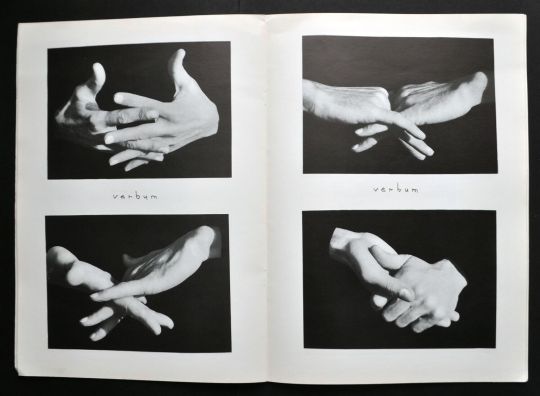
Ketty La Rocca, verbum, from Carlo Bonfà: 'Immissioni' / Giuseppe del Franco: 'Inconsupertrafa', Ketty La Rocca: 'Novilunio', Luigi Ontani: 'Teofania', Centro di attività visive – Palazzo dei Diamanti, Ferrara, 1971 [p_c_c_c. © Archivio Ketty La Rocca | Michelangelo Vasta]
Text(s): Renato Barilli
Exhibition: May 22 – June 6, 1971
#graphic design#art#poetry#visual poetry#visual writing#performance#photography#exhibition#catalogue#catalog#ketty la rocca#renato barilli#archivio ketty la rocca#palazzo dei diamanti#1970s
27 notes
·
View notes
Text
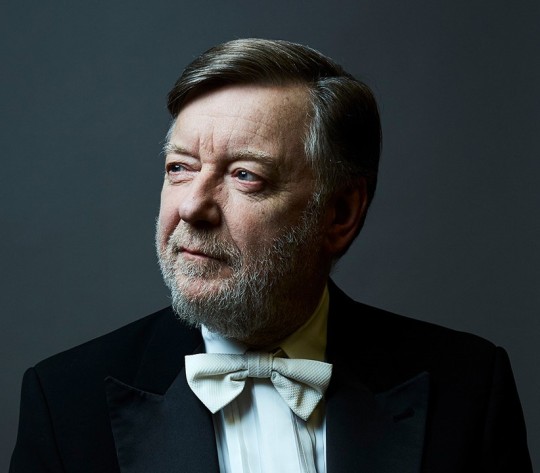
Sir Andrew Davis
One of Britain’s greatest conductors widely admired for leading the BBC Symphony Orchestra at the Proms
One of the most beloved and highly esteemed conductors of his generation, Sir Andrew Davis, who has died aged 80 of leukaemia, was a familiar presence on the podium, not least through his countless appearances at the BBC Proms in his capacity as chief conductor of the BBC Symphony Orchestra (1989-2000).
After Adrian Boult, his was the second longest tenure of the post in the history of the orchestra. During the same period he was also music director of Glyndebourne Opera (1988–2000), conducting works by Mozart, Janáček and Richard Strauss, among many others.
The sheer range of his repertoire was in fact one of the defining features of Davis’s career. Not only was he acclaimed as an empathetic interpreter of British music from Elgar and Vaughan Williams to Holst and Bliss, but he also had the ability to assimilate contemporary scores such as Michael Tippett’s The Mask of Time, Harrison Birtwistle’s The Mask of Orpheus, Nicholas Sackman’s Hawthorn or David Sawer’s Byrnan Wood, all of which were either introduced at the Proms or recorded. The Birtwistle was named record of the year at the Gramophone awards in 1987.
But as he showed season after season in the BBC post, Davis could bring both vitality and a discerning sense of idiom to almost any music. One recalls, almost at random, a 2015 concert featuring a sensuous account of Delius’s In a Summer Garden, followed by a lithe and muscular suite from Ravel’s erotic Daphnis et Chloé, the ecstatic choral shouts and shuddering climaxes leaving little to the imagination. The concert also included music by Carl Nielsen and a new work, Epithalamion, by Hugh Wood.
One of many highlights of his Proms appearances was his commanding premiere in 1998 of Elgar’s Third Symphony in the “elaboration” by Anthony Payne (effectively a performing version made from the composer’s sketches).
Another was his speech from the podium in 1992, delivered as a patter song to the tune of Gilbert and Sullivan’s “I am the very model of a modern major-general”, complete with witty rhymes and repartee with the delighted audience. The trick was repeated on the final night of the 2000 festival, his last as the orchestra’s chief conductor. On his arrival at the BBC Symphony Orchestra, the more truculent members of the ensemble had to be won over, but they were, by his genial humour and charm, as well as his purely musical talents.
He was also popular with soloists, not necessarily offering a radically new perspective of his own, but listening carefully to them to provide an ideal accompaniment. The pianist Stephen Hough said he had “the sharpest ear and the clearest stick”. Both on and off the podium Davis exuded bonhomie and affability. His concern as a conductor was always to create the conditions that enabled musicians to give of their best.
Born in Ashridge, Hertfordshire, he was the son of Robert Davis, a compositor, and his wife, Joyce (nee Badminton). Andrew began to learn the piano at the age of five and attended Watford grammar school. In 1959 he started organ studies with Peter Hurford and subsequently won an organ scholarship to King’s College, Cambridge, where he played under David Willcocks. He then studied conducting at the Accademia di S Cecilia, Rome, under Franco Ferrara, and in London with George Hurst. From 1966 to 1970 he was pianist, harpsichordist and organist with the Academy of St Martin in the Fields.
In 1970 he made his debut with the BBC Symphony Orchestra and in the same year was appointed assistant conductor of the BBC Scottish Symphony Orchestra. He then became principal guest conductor of the Royal Liverpool Philharmonic Orchestra (1974–77) and music director of the Toronto Symphony Orchestra (1975–88), whose stature he boosted with major tours of North America, Europe and Asia. In 1982, he helped establish the orchestra’s new home at Roy Thomson Hall, and advised on the construction of its organ.
Then came the posts at the BBC Symphony Orchestra and Glyndebourne. His debut at the latter had been in Strauss’s Capriccio (1973) and he was to become a noted exponent of the composer’s operas.
In 1989 he married the soprano Gianna Rolandi, whom he had met when she sang Zerbinetta under his baton first at the Metropolitan, New York, in 1984 and again at Glyndebourne in 1988.
On his retirement from the BBC in 2000 he moved to the US with Rolandi and their son, Edward, to take up the appointment of music director, until 2021, of the Lyric Opera of Chicago, where he conducted nearly 700 opera performances including Wagner’s Ring cycle (2004–05). A second cycle was planned for the 2019–20 season, but was never completed on account of the Covid pandemic. He additionally conducted orchestral concerts at the Lyric and free concerts at Millennium Park.
From 2012 to 2019, he also held the post of chief conductor of the Melbourne Symphony Orchestra, becoming conductor laureate, while continuing to live in the US.
In addition to his conducting, he made an orchestration of Handel’s Messiah, performing it with the Toronto orchestra, and of Berg’s Piano Sonata, op 1, and Passacaglia (Berg was a composer who inspired him, he once said, throughout his life). His own compositions included La Serenissima: Inventions on a Theme by Claudio Monteverdi (1980), Chansons Innocentes for children’s chorus and orchestra (1984) and Alice (2003) – settings of Lewis Carroll for mezzo-soprano, tenor and children’s chorus. At his death he was working on orchestrating some of JS Bach’s organ music.
During the pandemic lockdown he drew on his knowledge of the classics, gained as a student, to undertake an original translation of Virgil’s Aeneid. Though modest about his poetic abilities, he did comment that the experience was comparable to that of making music: “The manipulation of sonorities and rhythms and the search for ways of bringing to life the vividness of Virgil’s imagery and at times his great emotional power struck me as remarkably similar to the search that I have been engaged in all my life on the podium.”
His numerous recordings reflect the vast range of his repertoire, British and contemporary music looming large alongside Stravinsky, Strauss, Berlioz, Ives, Sibelius, Weill and the complete Dvořák symphonies. A 16-CD retrospective collection celebrating British composers on Teldec’s The British Line series was released by Warner Classics.
In 1991, he received the Royal Philharmonic Society/Charles Heidsieck music award. He was appointed CBE in 1992 and knighted in 1999.
Rolandi died in 2021. Davis is survived by Edward, a composer, singer and conductor.
🔔 Andrew Frank Davis, conductor, born 2 February 1944; died 20 April 2024
Daily inspiration. Discover more photos at Just for Books…?
5 notes
·
View notes
Text
Libri che vanno letti 31
Lo ricordo come fosse l’altro ieri.
Il professore con cui poi mi sono laureato aveva invitato un poeta.
Si chiamava Franco Ferrara.
Indossava un cappello in stile Indiana Jones.
E aveva portato con sé alcune copie delle sue opere.
Io ero riuscito ad accaparrarmene addirittura tre.
Fra cui quella che sto per segnalarvi: Imzad.
Il libro è bellissimo.
Sia come oggetto (era una cosa particolare: confezionato con carta grigia riciclata stampata solo sul lato destro), sia come opera letteraria.
Era un poeta vero.
Mica uno di quelli che si ritengono tali solo perché riescono a mettere una serie di frasi una sopra l’altra.
Non so cosa sia stato di lui.
Ma conservo ancora gelosamente i suoi tre libri.
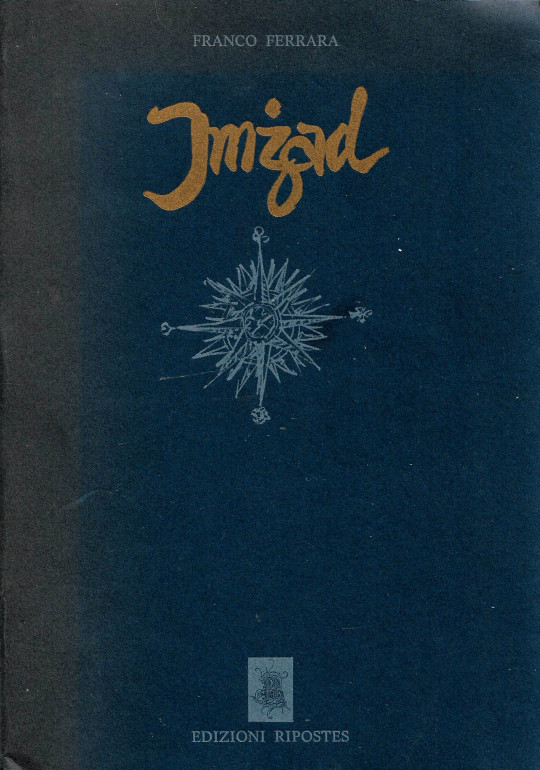
3 notes
·
View notes
Photo
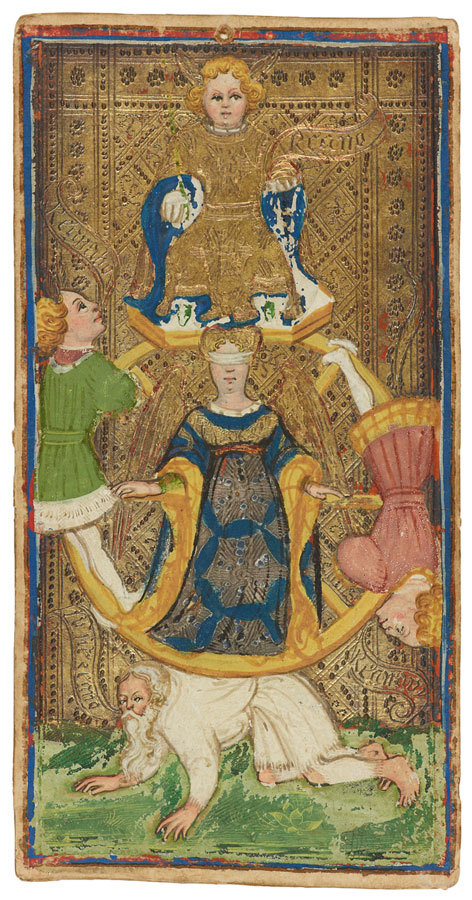
Tarot Card: Wheel of Fortune
https://www.themorgan.org
Medieval and Renaissance Manuscripts (MRMSS)
*Call Number:B1 363 C MS M.0630
*Location:Medieval and Renaissance Manuscripts (MRMSS)
*Call Number:B1 363 D
*Title:Visconti-Sforza Tarot Cards.
Created:Milan, Italy, ca. 1450-1480
Related Records:Click here for related items
Genres:Illuminated manuscripts--Italy--Milan--15th century.
Cardboard.
Cuir bouilli--France--14th century.
Emblems (symbols)--Italy--Milan--15th century.
Devices (symbols)--Italy--Milan--15th century.
Playing cards--Italy--Milan--15th century.
Language:Latin captions on card 9; French inscription on cards 28, 29, and 34: A BON DROYT.
Notes:Tarot cards; 33 illuminated in Milan, Italy, ca. 1450, and 3 replacement cards (M.630.5 - Temperance; M.630.8 - Fortitude; and M.630.13 - The Sun) illuminated ca. 1480.
Decoration: 8 court cards and 15 trump cards with figural representations, 12 decorated pip (numerical) cards.
Tarot Card: Wheel of Fortune -- Woman (personification of fortune), winged, blindfolded, is at center of wheel, at top of which is man, with ass's ears, seated, with scepter in right hand. Below, flanking the wheel are two male figures, one upright, also with ass's ears, and the other upside down, with tail. Below the wheel is bearded man on hands and knees.
Scrolls accompany each figure. Man at top of wheel has scroll with inscription REGNO; man at left has scroll inscribed REGNABO; man at right has scroll with inscription REGNAVI; and man at bottom has scroll inscribed SUM SINE REGNO.
Artist: The original cards have been attributed to Francesco Zavattari, while more agree with the attribution to Bonifacio Bembo. The replacement cards have traditionally been attributed to the Cremonese artist Antonio Cicognara, an attribution questioned by Dummett (1980), who suggests instead an artist from Ferrara or (Dummett 2007) Benedetto Bembo (brother of Bonifacio) and proposes that they were not replacements but part of the original set as designed by the Bembo workshop. Bauer-Eberhardt (1997) advances Franco dei Russi (or de' Russi) as the artist of these later cards, attribution accepted by the exhibition catalogue Tarots enluminés (2021).
A complete pack of tarot cards consists of seventy-eight cards; the thirty-five cards in the Pierpont Morgan Library, twenty-six in the Accademia Carrara in Bergamo, and thirteen owned by the Colleoni family of Bergamo form one of the most complete sets of 15th cent. painted tarot cards of Italian origin.
Executed by or for a member of the Visconti-Sforza family (emblems and devices of both families found intermingled on the cards, i.e., the Sforza three interlinked diamond rings, the Visconti ducal crown of Milan with palm and laurel), probably Francesco Sforza (d. 1466), most likely after his triumphal entry as Duke of Milan 25 March 1450; the patrician family Bon from Venice?, as suggested by heraldic elements in certain cards (parti de gueles et d'argent) and a haloed lion holding a book on the shield of the King of Swords (M.630.22); Count Alessandro Colleoni of Bergamo (d. 1900); purchased by J. Pierpont Morgan (1837-1913) through Hamburger Frères, Paris, in 1911; by descent to J.P. Morgan (1867-1943).
10 notes
·
View notes
Text
Events 3.27 (before 1950)
1309 – Pope Clement V imposes excommunication and interdiction on Venice, and a general prohibition of all commercial intercourse with Venice, which had seized Ferrara, a papal fiefdom.
1329 – Pope John XXII issues his In Agro Dominico condemning some writings of Meister Eckhart as heretical.
1513 – Spanish explorer Juan Ponce de León reaches the northern end of The Bahamas on his first voyage to Florida.
1625 – Charles I becomes King of England, Scotland and Ireland as well as claiming the title King of France.
1638 – The first of four destructive Calabrian earthquakes strikes southern Italy. Measuring magnitude 6.8 and assigned a Mercalli intensity of XI, it kills 10,000–30,000 people.
1782 – The Second Rockingham ministry assumes office in Great Britain and begins negotiations to end the American War of Independence.
1794 – The United States Government establishes a permanent navy and authorizes the building of six frigates.
1809 – Peninsular War: A combined Franco-Polish force defeats the Spanish in the Battle of Ciudad Real.
1814 – War of 1812: In central Alabama, U.S. forces under General Andrew Jackson defeat the Creek at the Battle of Horseshoe Bend.
1836 – Texas Revolution: On the orders of General Antonio López de Santa Anna, the Mexican Army massacres 342 Texian Army POWs at Goliad, Texas.
1866 – President of the United States of America Andrew Johnson vetoes the Civil Rights Act of 1866. His veto is overridden by Congress and the bill passes into law on April 9.
1871 – The first international rugby football match, when Scotland defeats England in Edinburgh at Raeburn Place.
1884 – A mob in Cincinnati, Ohio, United States attacks members of a jury which had returned a verdict of manslaughter in what was seen as a clear case of murder; over the next few days the mob would riot and burn down the courthouse.
1886 – Geronimo, Apache warrior, surrenders to the U.S. Army, ending the main phase of the Apache Wars.
1899 – Emilio Aguinaldo leads Filipino forces for the only time during the Philippine–American War at the Battle of Marilao River.
1901 – Philippine–American War: Emilio Aguinaldo, leader of the First Philippine Republic, is captured by the Americans.
1912 – First Lady Helen Taft and the Viscountess Chinda, wife of the Japanese ambassador, plant two Yoshino cherry trees on the northern bank of the Potomac River in Washington, D.C., the origin of the National Cherry Blossom Festival.
1915 – Typhoid Mary, the first healthy carrier of disease ever identified in the United States, is put in quarantine for the second time, where she would remain for the rest of her life.
1918 – The National Council of Bessarabia proclaims union with the Kingdom of Romania.
1933 – Japanese invasion of Manchuria: Japan leaves the League of Nations after it approves the Lytton Report that ruled in favour of China.
1938 – Second Sino-Japanese War: The Battle of Taierzhuang begins, resulting several weeks later in the war's first major Chinese victory over Japan.
1941 – World War II: Yugoslav Air Force officers topple the pro-Axis government in a bloodless coup.
1942 – The Holocaust: Nazi Germany and Vichy France begin the deportation of 65,000 Jews from Drancy internment camp to German extermination camps.
1943 – World War II: Battle of the Komandorski Islands: In the Aleutian Islands the battle begins when United States Navy forces intercept Japanese attempting to reinforce a garrison at Kiska.
1945 – World War II: Operation Starvation, the aerial mining of Japan's ports and waterways begins. Argentina declares war on the Axis Powers.
0 notes
Link
A Citta' della Pieve ottant'anni di pittura di Franco Bellardi Prenderà il via sabato 23 marzo alle ore 17 la grande antologica del pittore Franco Bellardi che offre a Città della Pieve, agli amici e agli appassio...
0 notes
Text
Il Messina strappa un pareggio al Potenza - VIDEO
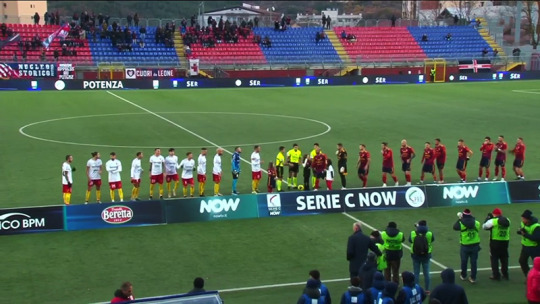
Partita poco spettacolo, ma il Messina attento e preciso, soprattutto in difesa, alla fine a strappato un pareggio nel difficile campo di Potenza.
Modica schiera il suo 4-3-3 con Fumagalli in porta, Salvo e Ortisi terzini e manetta e Pacciardi centrali; centrocampo con Firenze, Franco e Frisenna; in attacco Emmausso, Plescia e Ragusa.
Dopo appena 30 secondi il Potenza si rende pericoloso con un tiro da fuori di Saporiti ben parato da Fumagalli. All’8’ Volpe si rende pericolo in area del Messina, ma ancora una volta Fumagalli ferma il pallone. Nel secondo tempo il Potenza è ancora più intraprendente al 64’ Steffè crossa in rea Candellori colpisce di tacco, ma Salvo respinge quasi dalla linea di porta. Al 75’ Pace in area mette fuori il pallone. Al 79’ Candellori raccoglie in area un cross, ma la difesa del Messina mette in angolo. All’85’ un tiro non troppo forte di Rossetti dal limite viene prato da Fumagalli.
Il Messina non si è mai reso pericoloso, ma durante tutto il match ha controllato l’avversario. Buona la difesa, centrocampo poco incisivo dal punto di vista della costruzione. Plescia praticamente mai servito, mentre per Emmausso un passo indietro rispetto alle precedenti prestazioni con una partita anonima ed un ammonizione che porta alla sua squalifica per l’ultima partita casalinga del girone di andata contro il Monopoli.
Tabellino
Potenza-Messina 0-0
Potenza: Alastra, Sbraga, Armini, Maddaloni, Hadziosmanovic, Saporiti (59' Steffè), Schiattarella (77' Laaribi), Candellori, Volpe (71' Pace), Di Grazia (71' Rossetti), Asencio (71' Gagliano). A disposizione: Gasparini, Iacovino, Hristov, Monaco, Verrengia, Gyamfi, Pisapia, Prezioso. Allenatore: De Giorgio.
Messina: Fumagalli, Salvo, Manetta, Pacciardi, Ortisi, Firenze (92' Giunta), Franco (70' Cavallo), Frisenna, Emmausso (84' Luciani), Plescia (70' Scafetta), Ragusa (70' Zunno). A disposizione: De Matteis, Polito, Darini, Ferrara, Zammit. Allenatore: Modica.
Arbitro: Angelillo di Nola (Colaianni-Lauri).
Read the full article
0 notes
Text
The beaten path is safest (LIQUIDFIRE)
• Jessica Szohr's foot
• John F. Kennedy, Jr.'s breast
• Benedict Cumberbatch's mouth
• Mary-Kate Olsen's nostril
• Britney Spears's lip (Debden)
• James Franco's lip
• Roberto Martinez's foot
• Jerry Ferrara's arm
• Lauren Graham's buttocks
• Kylie Jenner's hair
• Vanessa Hudgens's tooth
• Jersey Shore's eyebrow
• Jenna Ushkowitz's nose (Russell Square)
• Dave Navarro's calf
• Christy Turlington's tongue (Mornington Crescent)
• Richie Sambora's forehead (Ickenham)
• Rachel Weisz's knee
• James Rodriguez's waist
• Phil Mickelson's lower leg (Oval)
• Richard Gere's eyebrow
• Kris Humphries's ear
• Rita Ora's nose (Stratford)
• Alex Pettyfer's eyelash (Leytonstone)
• Shiloh Jolie-Pitt's buttocks (Hornchurch)
• Chandra Wilson's hip (Camden Town)
• Tiger Woods's hair (Boston Manor)
• Giuliana Rancic's elbow
• Ne-Yo's hand
• Laura Dern's knee
• George Clooney's hip
• Shay Mitchell's lip
• Abbie Cornish's breast
• Michelle Williams's foot
• Alex McCord's finger
• Renee Zellweger's ankle
• Matt Lanter's hair
• Isabella Rossellini's eye
• Ashley Tisdale's lip (Wood Lane)
• Katherine Heigl's eyebrow
• Tom Hanks's head
• Amy Poehler's upper arm (Sudbury Town)
• Curtis Stone's mouth
• Patrick Swayze's lower leg (Bethnal Green)
• Chris Evans's elbow (Harrow-on-the-Hill)
• Rory McIlroy's wrist (Uxbridge)
• Kelsey Grammer's back
• Andrew Firestone's eyelash
• Melissa Rycroft's fist
• Joe Jonas's tongue
• Dr. Dre's hip
0 notes
Text
Edgar, opera dimenticata di Giacomo Puccini
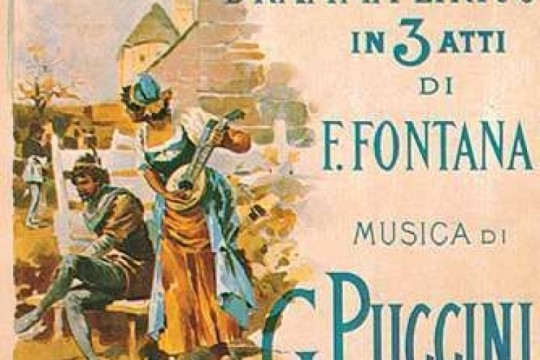
Il 29 novembre 1924 moriva, in un ospedale di Bruxelles, il leggendario compositore Giacomo Puccini, autore di capolavori come La Boheme e Madame Butterfly, ma anche di Edgar, lavoro ispirato alla grand opera francese…
Nel 1889 il successo delle Villi convinse l’editore Giulio Ricordi ad accogliere Puccini nella sua scuderia, a concedergli uno stipendio fisso mensile di 200 lire e a commissionargli una seconda opera, Edgar, su libretto di Ferdinando Fontana, tratta dal poema drammatico La coupe et les lèvres di Alfred de Musset.
La composizione impegnò Puccini per quattro anni, mentre cominciò la sua travagliata relazione con Elvira Bonturi, da cui ebbe il primogenito Antonio.
La prima rappresentazione di Edgar, avvenuta il 21 aprile 1889 diretta da Franco Faccio e con Romilda Pantaleoni alla Scala di Milano, non fu quel successo che Puccini e Ricordi si aspettavano, infatti fu seguita da solo due repliche.
Subito dopo Puccini iniziò a revisionare la partitura in vista di una possibile ripresa, che avvenne soltanto nel settembre 1891 al Teatro del Giglio di Lucca, con un grande successo.
La rappresentazione lucchese servì a Puccini per definire una nuova versione in tre atti, abolendo il quarto e riducendo il secondo, che andò in scena nel 1892 a Ferrara, Torino, Madrid e Brescia.
Una terza versione fu preparata per il festival pucciniano organizzato nel 1905 a Buenos Aires, ma l’esito fu deludente, venne poi rappresentata a La Valletta nel 1920
In Italia Edgar tornò prima alla radio, il 10 agosto 1935, e poi sulla scena, al Teatro Lirico di Milano, il 24 dicembre 1944.
Il 25 giugno 2008 l'opera fu finalmente allestita, al Teatro Regio di Torino, in una versione simile a quella della prima scaligera con José Cura ed Amarilli Nizza e venne riproposta anche al Teatro Comunale di Bologna nel 2010.
La vicenda comincia nel 1302, in un villaggio delle Fiandre, durante la Messa mattutina, quando Tigrana, una zingara, intona una canzone blasfema suscitando l’indignazione del paese che l’ha allevata.
La zingara viene difesa dal giovane Edgar il quale, nonostante sia innamorato dalla dolce Fidelia, non riesce a sottrarsi al fascino di Tigrana tanto da decidere di fuggire con lei.
In poco tempo i due amanti vivono in un sontuoso castello, ma Edgar non comincia a sentire molto intensamente la nostalgia per la sua casa e Fidelia così, sentendo rulli di tamburi e suoni di fanfare militari che accompagnano un esercito diretto a una battaglia, decide di cambiare vita e segue, ignorando i tentativi di Tigrana per trattenerlo, il gruppo guidato da Frank, fratello di Fidelia
L’esercito fiammingo vince lo scontro, ma subisce ingenti perdite e tra gli scomparsi c’è anche Edgar per il quale nei pressi del villaggio si stanno celebrando solenni funerali.
Alla celebrazione delle gesta di Edgar c’è un frate che ricorda a tutti le numerose colpe di cui si è macchiato il giovane suscitando la reazione di Fidelia, decisa a difendere la memoria dell’amato. Finita la cerimonia funebre, giunge Tigrana che viene avvicinata dal frate che, offrendole oro e oggetti preziosi, le suggerisce una macchinazione ai danni del morto.
Tigrana così ammette di essere stata l’amante di Edgar aggiungendo che era intenzionato a tradire la sua patria.
Alla sue affermazioni alcuni soldati si avvicinano per profanare la bara, ma, aprendola, trovano soltanto l’armatura così il frate, che altri non è se non Edgar, si spoglia del suo saio e accusa Tigrana di fronte a tutti.
Fidelia, dopo una notte insonne e tormentata, si reca al balcone per guardare le sue rose e , alla vista di Edgar e del fratello, sviene.
Ripresasi, la giovane rassicurata da Edgar che le propone il matrimonio da celebrarsi quello stesso giorno.
Mentre si sta preparando per le nozze Fidelia è raggiunta da Tigrana che la uccide con un pugnale poi la zingara, senza pentirsi, viene condotta al patibolo.
Read the full article
0 notes
Text
Opera on YouTube 3
Il Barbiere di Siviglia (The Barber of Seville)
Mario Lanfrachi studio film, 1965 (Sesto Bruscantini, Valeria Mariconda, Ugo Benelli; conducted by Alberto Zedda; no subtitles)
Jean-Pierre Ponnelle studio film, 1974 (Hermann Prey, Teresa Berganza, Luigi Alva; conducted by Claudio Abbado; English subtitles)
New York City Opera, 1976 (Alan Titus, Beverly Sills, Henry Price; conducted by Sarah Caldwell; English subtitles)
Arena Sferisterio, 1980 (Leo Nucci, Marilyn Horne, Ernesto Palacio; conducted by Nicola Rescingo; no subtitles)
Teatro Real de Madrid, 2005 (Pietro Spagnoli, Maria Bayo, Juan Diego Flórez; conducted by Gianluigi Gelmetti; Arabic subtitles)
Teatro la Fenice, 2008 (Roberto Frontali, Rinat Shaham, Francesco Meli; conducted by Antonino Fogliani; Italian subtitles)
Royal Opera House, Covent Garden, 2009 (Pietro Spagnoli, Joyce DiDonato, Juan Diego Flórez; conducted by Antonio Pappano; English subtitles)
Vienna State Opera, 2019 (Rafael Fingerlos, Margarita Gritskova, Juan Diego Flórez; conducted by Evelino Pidó; English subtitles)
Arena di Verona, 2022 (Leo Nucci, Nino Machaidze, Dmitry Korchak; conducted by Daniel Oren; English subtitles)
Garsington Opera, 2023 (Johannes Kamler, Katie Bray, Andrew Stenson; conducted by Douglas Boyd; English subtitles)
Rigoletto
Wolfgang Nagel studio film, 1977 (Rolando Panerai, Franco Bonisolli, Margherita Rinaldi; conducted by Francesco Molinari-Pradelli; Japanese subtitles)
Metropolitan Opera, 1977 (Cornell MacNeil, Plácido Domingo, Ileana Cotrubas; conducted by James Levine; no subtitles)
Metropolitan Opera, 1981 (Cornell MacNeil, Luciano Pavarotti, Christiane Eda-Pierre; conducted by James Levine; no subtitles)
Jean-Pierre Ponnelle film, 1982 (Ingvar Wixell, Luciano Pavarotti, Edita Gruberova; conducted by Riccardo Chailly, English subtitles)
English National Opera, 1982 (John Rawnsley, Arthur Davies, Marie McLaughlin; conducted by Mark Elder, sung in English)
La Monnaie, Brussels, 1999 (Anthony Michaels-Moore, Marcelo Álvarez, Elizabeth Futral; conducted by Vladimir Jurowski; no subtitles)
Arena di Verona, 2001 (Leo Nucci, Aquiles Machado, Inva Mula; conducted by Marcello Viotti; Italian subtitles)
Zürich Opera house, 2006 (Leo Nucci, Piotr Beczala, Elena Mosuc; conducted by Nello Santi; no subtitles)
Paris Opera, 2016 (Quinn Kelsey, Michael Fabiano, Olga Peretyatko; conducted by Nicola Luisotti; English subtitles)
Teatro Massimo, 2018 (George Petean, Ivan Ayon Rivas, Grazia Schiavo; conducted by Stefano Ranzani; English subtitles)
Così Fan Tutte
Vaclav Kaslik studio film, 1969 (Gundula Janowitz, Christa Ludwig, Luigi Alva, Hermann Prey; conducted by Karl Böhm; English subtitles)
Jean-Pierre Ponnelle studio film, 1988 (Edita Gruberova, Delores Ziegler, Luis Lima, Ferruccio Furlanetto; conducted by Nikolaus Harnoncourt; English subtitles) – Act I, Act II
Teatro alla Scala, 1989 (Daniela Dessì, Delores Ziegler, Josef Kundlak, Alessandro Corbelli; conducted by Riccardo Muti; Italian subtitles) – Act I, Act II
Théâtre du Châtelet, 1992 (Amanda Roocroft, Rosa Mannion, Rainer Trost, Rodney Gilfry; conducted by John Eliot Gardiner; English subtitles)
Vienna State Opera, 1996 (Barbara Frittoli, Angelika Kirschlager, Michael Schade, Bo Skovhus; conducted by Riccardo Muti; English and Italian subtitles)
Teatro Comunale di Ferrara, 2000 (Melanie Diener, Anna Caterina Antonacci, Charles Workman, Nicola Ulivieri; conducted by Claudio Abbado; no subtitles)
Zürich Opera House, 2000 (Cecilia Bartoli, Liliana Nikiteanu, Roberto Saccá, Oliver Widmer; conducted by Nikolaus Harnoncourt; no subtitles) – Act I, Act II
Opera Lyon, 2007 (Maria Bengtsson, Tove Dahlberg, Daniel Behle, Vito Priante; conducted by Stefano Montanari; French subtitles)
Salzburg Festival, 2009 (Miah Persson, Isabel Leonard, Topi Lehtipuu, Florian Boesch; conducted by Adam Fischer; English subtitles)
Zürich Opera House, 2009 (Malin Hartelius, Anna Bonitatibus, Javier Camarena, Ruben Drole; conducted by Frans Welser-Möst; English subtitles)
Aïda
San Francisco Opera, 1981 (Margaret Price, Luciano Pavarotti; conducted by Luis Garcia Navarro; no subtitles)
Metropolitan Opera, 1985 (Leontyne Price, James McCracken; conducted by James Levine; English subtitles) – Act I, Act II, Act III, Act IV
Teatro alla Scala, 1986 (Maria Chiara, Luciano Pavarotti; conducted by Lorin Maazel; English subtitles)
Metropolitan Opera, 1989 (Aprile Millo, Plácido Domingo; conducted by James Levine; English subtitles)
Teatro Comunale di Busseto, 2001 (Adina Aaron, Scott Piper; conducted by Massimiliano Stefaneli; Italian subtitles)
St. Margarethen Opera Festival, 2004 (Eszter Szümegi, Konstantin Andreev; conducted by Ernst Marzendorfer; English subtitles)
Metropolitan Opera, 2012 (Liudmyla Monastyrska, Roberto Alagna; conducted by Fabio Luisi; Russian subtitles)
Tbisili State Opera, 2017 (Maqvala Aspanidze, Franco Tenelli; conducted by Marco Boemi; Russian subtitles)
Teatro Colón, 2018 (Latonia Moore, Riccardo Massi; conducted by Carlos Vieu; Spanish subtitles)
Teatro la Fenice, 2019 (Roberta Mantegna, Francesco Meli; conducted by Riccardo Frizza; French subtitles)
#opera#youtube#complete performances#il barbiere di siviglia#rigoletto#così fan tutte#aida#gioachino rossini#giuseppe verdi#wolfgang amadeus mozart
14 notes
·
View notes
Text
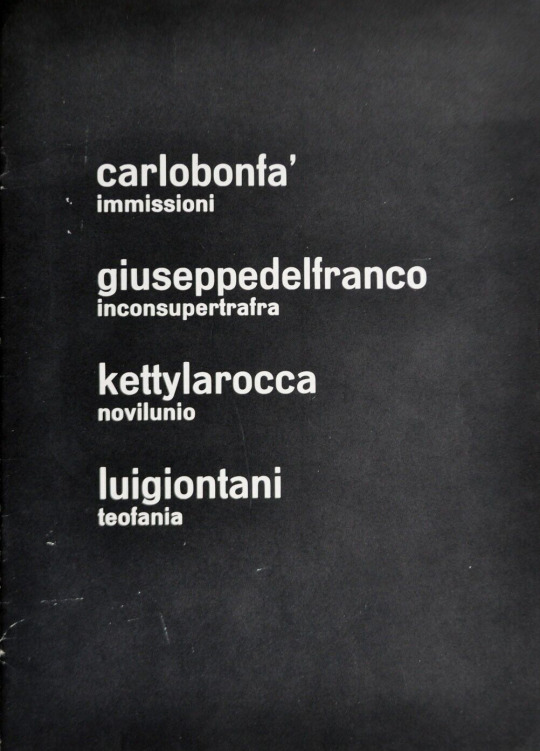
Carlo Bonfà: ‘Immissioni’ / Giuseppe del Franco: 'Inconsupertrafa’, Ketty La Rocca: 'Novilunio’, Luigi Ontani: 'Teofania’, Centro di attività visive – Palazzo dei Diamanti, Ferrara, 1971 [p_c_c_c.]
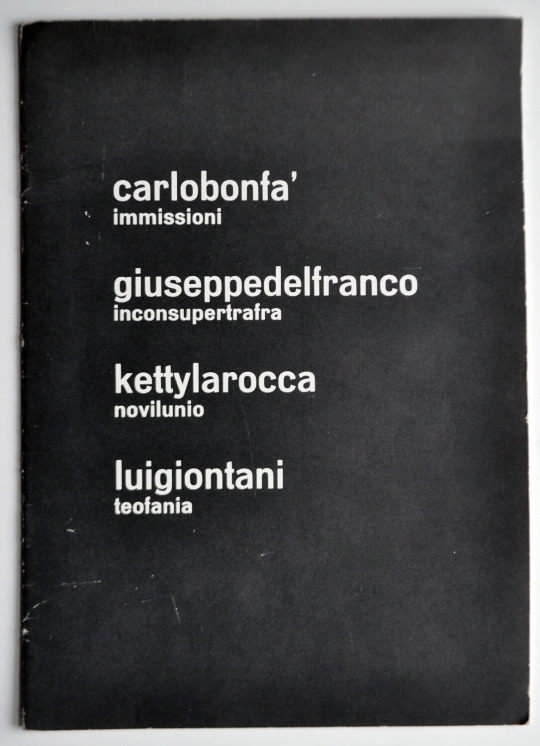
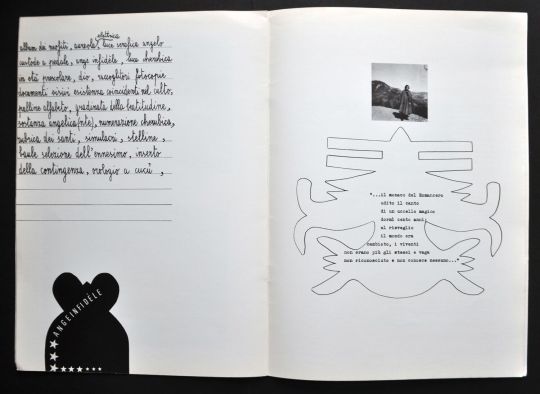
Text(s): Renato Barilli
Exhibition: May 22 – June 6, 1971
#graphic design#art#visual poetry#exhibition#catalogue#catalog#cover#carlo bonfà#giuseppe del franco#ketty la rocca#luigi ontani#renato barilli#archivio ketty la rocca#palazzo dei diamanti#1970s
13 notes
·
View notes
